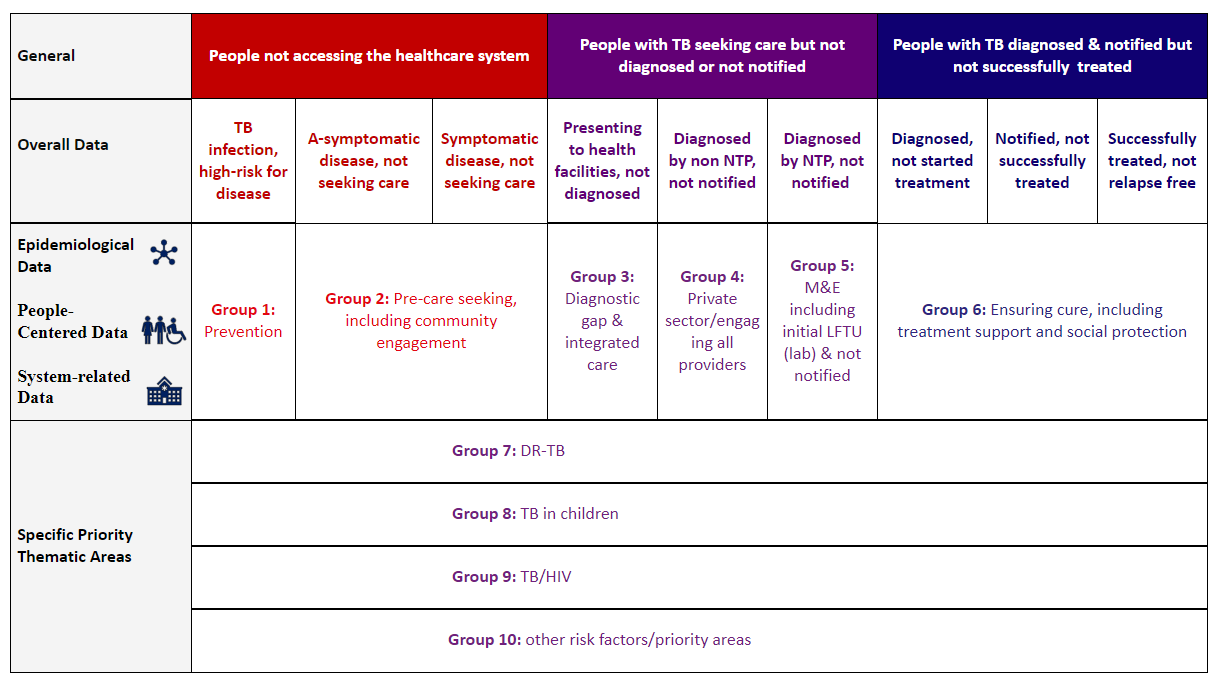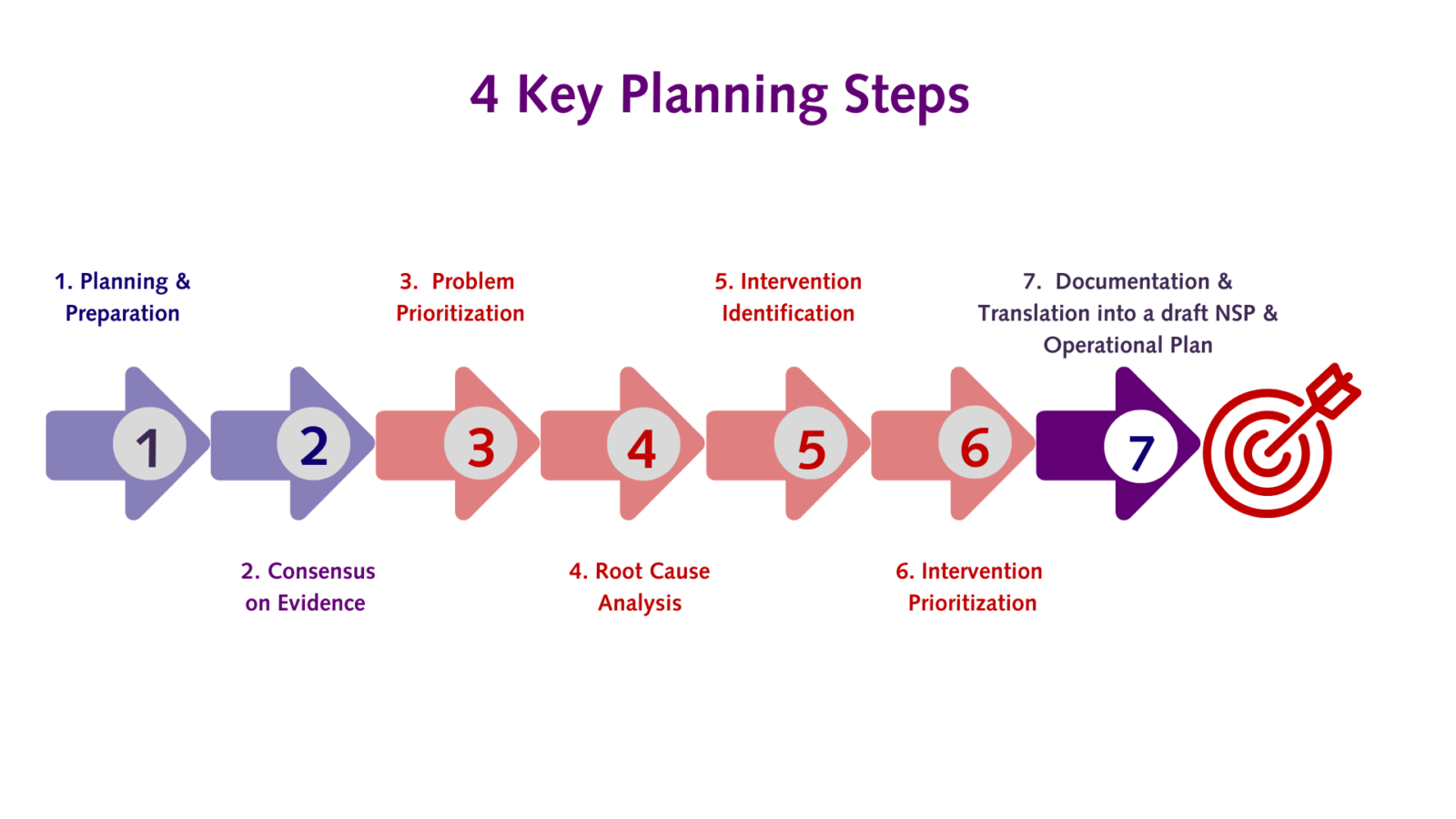To ensure maximum participation invitation letters to workshop participants should be sent a week before the workshop. An earlier “save the date” can be sent four weeks in advance. Invited participants should represent the diversity of stakeholders and affected communities in the country.
The data consolidation of national and subnational data has to be finalized two weeks before the workshop. The relevant deliverable for the stakeholder workshop is a standardized arrangement of summarized data presented along the care continuum. Templates are available for the summarized data, which can then be printed into a PDF in addition to the output of the PCF dashboard. Early adopter countries found it useful to make reference folders of the data consolidation results and visualizations available for the different working groups during the workshop.
A detailed workshop agenda (including objectives and expected outputs) and a listing of participants and facilitators should be developed. Chairs, rapporteurs, and moderators may be selected by facilitators ahead of time, or they can be nominated by working groups during the workshop. Early adopter countries found it useful to assign 2 moderators. chairs and 2 rapporteurs (using laptops for note-taking) to each working group and session to be able to keep up with potential fast-paced discussions. The workshop agenda should include a summary of what chairing and moderation processes will be used during the workshop. The PDF summary from the data consolidation analysis should be available to participants and facilitators before the workshop.
Workshop participants should be divided into sub-groups. These sub-groups should be assigned to focus on different areas of planning. It is recommended that some sub-groups are allocated to focus on different parts of the care continuum. Depending on resources and participants available, sub-groups could also be allocated to look at thematic areas (e.g. TB/HIV, DR-TB), geographic areas, or experiences of key populations. Participants may be assigned to a sub-group based on expertise and experience, or they may self-select, or a combination of the two. The composition of the sub-groups – if not predetermined at invitation – should be proposed at the end of the first day of the workshop to give participants time to study the respective chapters of the booklet with data consolidation findings. The following shows a suggested thematic division of working groups:

Workshop preparation & duration
The ideal duration of the consultative workshop is 4-5 days to allow sufficient time for discussion & feedback between working groups and establish consensus between the different planning steps. However, this has to be weighed against resource, logistics, and time constraints.

Preparation meeting
The NTP, core, and facilitation teams should meet and prepare at least 3-5 days before the workshop start. The objectives of the pre-workshop meeting(s) are to:
- Provide an overview of the framework and workshop method ensuring that all key staff and facilitators are familiar with the concepts, methodology and processes.
- Review and finalise the workshop objectives, expected outcomes, and agenda including time allocations, moderators, and/or facilitators for each session. Roles and responsibilities need to be clearly defined, processes and timing need to be defined and agreed upon. It is helpful to consider some contingency planning, arrangements, and procedures for potential technical and organizational problems (e.g. malfunctioning IT, disruptive participants, etc.)
- Allocate groups and explain group work and tools. Handouts, templates, and workshop materials such as flipcharts, sticky notes, markers, and laptops should be available, with a print-out of consolidated data. If possible, provide a laptop, projector, or screen for each group, as this will make the collaboration and documentation process more efficient.
- Assign facilitators and rapporteurs. Facilitators should have a good understanding of the evidence and the People-Centred framework and should circulate among groups to ensure that everyone understands the assigned task and answer any questions. Facilitators and rapporteurs need to be familiarised with and trained in the use of data consolidation reports and reference folders, working group templates, and reporting formats, etc.
- Arrange the logistics (registration, resources, rooms, refreshments, etc.)
Workshop management
Early adopter countries planned for and conducted facilitation team meetings at the beginning and end of each day. This allows for feedback from the previous proceedings, good preparation of the day’s sessions, troubleshooting of issues, and coordination plans. The end-of-day session is used to summarise the day’s proceedings, documenting the results and reports of the day’s sessions, and fine-tuning the proceedings and assignments for the next day.
Draft agenda
>
|
Day/Time |
Activity |
|
|
Day 1 |
||
|
7:30-8:30 |
Facilitation team meeting |
|
|
8:30-9:00 |
Registration |
|
|
9:00-9:30 |
Welcome & Introduction |
|
|
9:30-10:00 |
Introduction of workshop objectives and proceedings |
|
|
10:00-10:15 |
Coffee/ Tea break |
|
|
10:15-12:00 |
Introduction of PCF Approach (concept & philosophy) |
|
|
12:00-12:30 |
Lunch |
|
|
13:00-14:00 |
Programme update, presentation of data consolidation and programme review findings (including Q&A) |
|
|
14:00-14:15 |
Coffee/ Tea break |
|
|
14:15-16:00 |
Continuation of Programme update, presentation of data consolidation and programme review findings (including Q&A and consensus on findings) |
|
|
16:00-16:30 |
Day summary & instructions for Day 2 |
|
|
16:30-18:30 |
Facilitation team meeting |
|
|
Day 2 |
||
|
8:00-9:00 |
Facilitation team meeting |
|
|
9:00-9:30 |
Welcome & instructions for day and groupwork (Concept & methodology of problem prioritisation) |
|
|
9:30-10:00 |
Problem prioritisation |
|
|
10:00-10:15 |
Coffee/ Tea break |
|
|
10:15-12:00 |
Problem prioritisation continued |
|
|
12:00-12:30 |
Rapporteur session [Optional] |
|
|
12:30-13:00 |
Lunch |
|
|
13:00-15:00 |
Problem prioritisation continued |
|
|
15:00-15:15 |
Coffee/ Tea break |
|
|
15:15-16:30 |
Plenary session – group reports and Q&A |
|
|
16:30-17:00 |
Day summary & instructions for Day 3 |
|
|
17:00-19:00 |
Facilitation team meeting |
|
|
Day 3 |
||
|
8:00-9:00 |
Facilitation team meeting |
|
|
9:00-9:30 |
Welcome & instructions for day and groupwork (Concept & methodology of root cause analysis) |
|
|
9:30-10:00 |
Root cause analysis |
|
|
10:00-10:15 |
Coffee/ Tea break |
|
|
10:15-12:00 |
Root cause analysis continued |
|
|
12:00-12:30 |
Rapporteur session [Optional] |
|
|
12:30-13:00 |
Lunch |
|
|
13:00-15:00 |
Root cause analysis continued [identification of opportunities] |
|
|
15:00-15:15 |
Coffee/ Tea break |
|
|
15:15-16:30 |
Plenary session – group reports and Q&A |
|
|
16:30-17:00 |
Day summary & instructions for Day 4 |
|
|
17:00-19:00 |
Facilitation team meeting |
|
|
Day 4 |
||
|
8:00-9:00 |
Facilitation team meeting |
|
|
9:00-9:30 |
Welcome & instructions for day and groupwork (Concept & methodology of intervention identification) |
|
|
9:30-10:00 |
Plenary – Update on latest international guidelines & best practices |
|
|
10:00-10:15 |
Coffee/ Tea break |
|
|
10:15-12:00 |
Intervention identification |
|
|
12:00-12:30 |
Rapporteur session [Optional] |
|
|
12:30-13:00 |
Lunch |
|
|
13:00-15:00 |
Intervention identification continued [identification of opportunities & collaboration] |
|
|
15:00-15:15 |
Coffee/ Tea break |
|
|
15:15-16:30 |
Plenary session – group reports and Q&A |
|
|
16:30-17:00 |
Day summary & instructions for Day 5 |
|
|
17:00-19:00 |
Facilitation team meeting |
|
|
Day 5 |
||
|
Facilitation team meeting |
||
|
9:00-9:30 |
Welcome & instructions for day and groupwork (Concept & methodology of intervention prioritisation & optimisation) |
|
|
9:30-10:00 |
Intervention prioritisation & optimisation |
|
|
10:00-10:15 |
Coffee/ Tea break |
|
|
10:15-12:30 |
Intervention prioritisation & optimisation continued |
|
|
12:30-13:00 |
Lunch |
|
|
13:00-15:00 |
Plenary session – group reports and Q&A |
|
|
15:00-15:15 |
Coffee/ Tea break |
|
|
15:15-16:30 |
Plenary session – consensus on prioritisation & next steps |
|
|
16:30-17:00 |
Closing |
|
|
17:00-19:00 |
Facilitation team meeting |
|
Workshop participants
The NTP should ensure that all relevant stakeholders and partners are invited. These may depend on the purpose and level of the workshop, and should include but not be limited to the following:
- Staff of national and sub-national TB programme;
- Relevant departments of ministries of health and other government agencies, such as those related to HIV, migration, social security, finance, justice (prisons), education, research, etc.
- Community groups, such as affected populations, and peer support groups;
- Civil Society Organisations, NGOs
- Private sector;
- National partners, including civil society and non-governmental organizations; and
- International partners.
Country approach examples
1. Kenya Objectives
Review country-data and evidence on the epidemiological situation of TB, on people (the knowledge and behaviors of populations), and on health systems (the TB service performance)
Identify additional evidence from stakeholders
- Identify additional evidence needs where there is no existing data
- Identify priority problems using available evidence generated
For each priority problem, identify root causes that are driving the suboptimal outcomes
Identify possible interventions to address the root causes and priority problems
Identify roles of the different stakeholders in the possible interventions
2. Kenya methodology
- Participatory data & evidence review
- Identification of key programmatic gaps and priorities
- Root cause analysis
- Consensus on effective strategies and high-impact interventions
3. Uganda stakeholder workshop
Data consolidation
- Organized a staff retreat to analyse the data and based on the data consolidation process a booklet was produced which was used during the National Consultation Workshop both in electronic and printed format.
- The NTLP in Uganda included information on TB, HIV, and leprosy in the booklet.
Stakeholder workshop
- A core group of facilitators was drawn from the group of NTP staff and consultants charged with delivering the workshop.
- This group determined how many sub-groups there should be, and what the sub-groups would focus on.
- Some participants were allocated to specific sub-groups ahead by agreement ahead of time; the rest of the group self-selected their sub-group during the first day of the workshop. Chairs and rapporteurs were nominated by each sub-group, and then the nominated chairs worked with meeting facilitators to record and aggregate findings from the discussions.
- At the end of each day of the National Consultation Workshop, a facilitator meeting is organized to discuss the findings of the day, gather all paper and electronic summaries as prepared and presented by the different groups. The topics and methods for the next day are introduced and discussed.
- A notetaker is appointed every day to minute and summarize the plenary sessions. This information is used for the development of the National Strategic Plan at a later point in time.
Last Update: Tuesday, January 3, 2023
